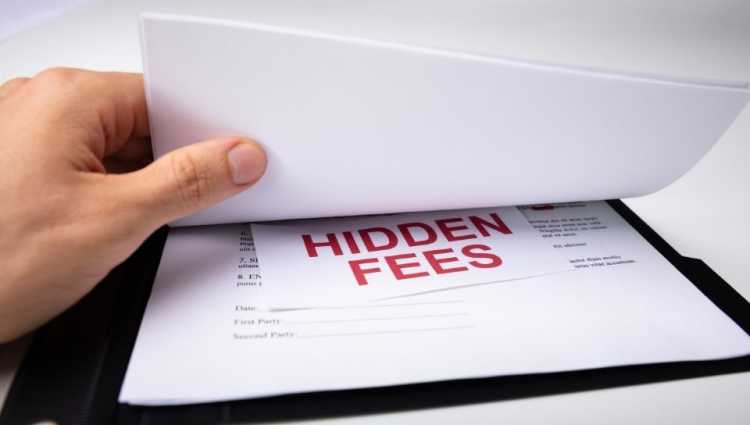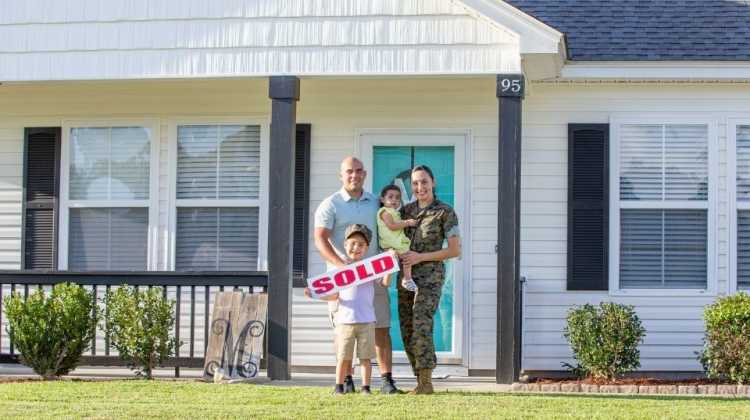Common Hidden Fees in Mortgage Loans
by Becca Stewart - April 18th, 2022

Military members are no strangers to packing up and starting over. But for military home buyers, that often means leaving one mortgage for another. And with each closing, those hidden fees in mortgage loans add up. What are typical mortgage closing costs? And can they be avoided?
What are my home loan options?
As a military home buyer, you have several options to fund your home purchase. Military service members, as well as some Reservists and military spouses, can qualify for a VA home loan. This loan allows service members to purchase a home with no money down and no private mortgage insurance (PMI). A VA loan might also have lower interest rates than other loan programs.
There is no limit to how many times you can use your VA loan benefits. You can even get a VA loan on a second property without selling the first. Of course, there are eligibility requirements and other stipulations. Click here to learn more about VA loans.
Your second option is to pursue a conventional mortgage loan. These are the “typical” loan programs available to all home buyers, regardless of military service. Conventional loans usually require buyers to have 20% of the loan’s value as a down payment. Without 20% down, buyers can expect to pay private mortgage insurance, which can cost an additional 0.5-2% of the loan total.
Unfortunately, VA loans often get a bad rap. There are many misconceptions about VA loan programs (read more about those here). Sellers sometimes pick conventional loan buyers over those with a VA, assuming conventional loans are a safer bet. In this highly competitive market, some buyers consider conventional mortgages to be a leg up on the competition.
Want to know more about your loan options? Check out this PCSgrades webinar.
Hidden fees in mortgage loans
You’ve found a home, secured a VA loan, and the buyers accepted your offer. Since you have a VA loan, you don’t need to bring any money to closing, right?
Wrong.
Unfortunately, every closing – whether VA or conventional – will have closing costs. There’s just no getting around that reality. Both the buyer and seller will need to pay closing costs. Some of those costs are expected, like real estate agent commissions, appraisal fees, and inspection costs. But there are hidden fees in mortgage loans that you might not expect, especially if you’re a first-time home buyer.
Some of the typical mortgage closing costs include:
Home inspection
Home appraisal
Loan origination fee
Underwriting fees
Legal fees
Title insurance
Government fees
Taxes
Homeowner’s association transfer fee
Title fees
Property survey
Real estate agent commissions
Your lender might offer to “roll these fees” into your mortgage, meaning you won’t have to bring anything to the closing table. That doesn’t mean the fees go away. Instead, it means those fees are tacked on to the total mortgage, meaning you’ll be paying for them over the life of your loan.
How can I reduce these typical mortgage closing costs?
Typical mortgage closing costs can add up. Buyers can expect to pay about 3%-6% of the total loan amount in closing costs, usually due on the day of closing. On a $200,000 loan, buyers could pay between $6,000 - $12,000 in closing costs! (Pro tip: start saving now).
While many of these closing costs are simply unavoidable, some are negotiable. First, shop around for lenders. Before choosing a lender, ask about their typical mortgage closing costs, paying attention to any hidden fees. If you have questions about their closing fees, ask if these costs are negotiable.
Some costs are non-negotiable. Appraisal costs, government fees, taxes, and courier fees are set in stone.
Other fees, though, have some wiggle room. You can reduce your overall mortgage closing costs by shopping around or working with your agent and lender to lower these fees:
Inspection costs
Inspection costs, for instance, vary depending on whom you hire as your home inspector. Your agent and/or lender may recommend a home inspector, but you can always hire someone else.
Homeowner’s insurance
You are required to purchase homeowner’s insurance before closing on your mortgage. However, you get to choose your policy and the insurance provider. Shopping around for homeowner’s insurance can help you reduce your closing costs since you will pay a portion of your insurance up front.
Origination fees
Origination fees are the charges from your lender to complete the underwriting process. Typically, these fees average about 1% of the total cost of your loan. However, you can negotiate with your lender, sometimes getting them to reduce or remove this fee.
Loan application fees
Many lenders charge a “loan application fee.” This fee varies by lender, so you can ask the lender to reduce or remove this charge.
Real estate commissions
On closing day, real estate agents for both the buyers and sellers receive their commission from the deal. Typically, sellers pay both agents’ commissions. However, buyers might be asked to pay these costs in the current market. Buyers can either negotiate with the sellers and ask not to pay commissions or negotiate directly with their real estate agent and ask for a slight reduction in commission. Hiring a military-aligned real estate agent can help reduce the overall cost of hiring a real estate agent.
As a buyer, you can also negotiate with the seller to have them cover some or all of your closing costs. However, sellers are in control in today’s market, so don’t expect sellers to pay anything.
Yes, refinancing has closing costs, too
If you’re refinancing an existing loan, either to borrow against the equity in your home or to take advantage of lower interest rates or a shorter repayment term, you will still have to pay closing costs.
There are fewer closing costs associated with refinancing. Still, you can expect to bring a hefty chunk of change to the closing table. Many of the fees will be the same as if you were applying for a brand-new mortgage:
Loan application fee
Home appraisal
Credit report fees
Title search and insurance fees
Document preparation fee
Loan origination fee
Depending on the terms of your original mortgage, you might also have an early repayment fee. Some mortgage lenders will charge a fee for paying off your mortgage before its term ends, helping them recoup the money they intended to make off your loan. Not all lenders have an early repayment fee; check with your current lender to see if this applies to you.
However, unlike your original loan, you won’t have to pay for a home inspection, homeowners association fees (if applicable), and you won’t pay real estate commissions.
Closing costs for a refinance can still add up to about 2-5% of the total loan amount. The lender might have a “no-money-down” refinance program, but keep in mind that this program doesn’t eliminate those fees. Instead, closing costs are rolled into your new mortgage.
Mortgage lenders for military families
As a military home buyer, you want a lender who knows your lifestyle and understands your options. A military-friendly lender can present you with all your home buying options and explain all associated costs. In some cases, a military-friendly real estate agent may also offer additional incentives for military families.
Find experienced, dedicated, military-friendly lenders and real estate agents through our PCSgrades network. Get started here.








